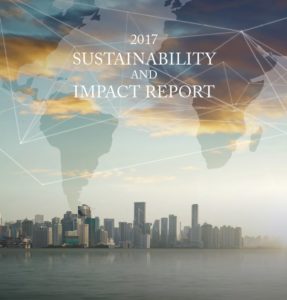Impact Investing & ESG
Financing the Sustainable Development Goals: Impact Investing in Action
It is important for impact investors to align existing assets to the global goals; however, there is not enough new capital being channeled into solutions. The UN estimates that USD 5-7 trillion is needed annually to achieve the goals.
Private debt investors look for impact – to reduce risk and lower costs
Private debt – direct business lending from funds rather than banks – has experienced a boomlet in financial markets since the 2008 crisis. Last year, hedge funds, private equity funds and asset managers raised a record $107 billion of capital to lend to businesses to fund growth, buyouts and finance acquisitions.
Making the Case for Impact Investing
For a small but growing number of nextgen high net worth individuals, it is no longer simply investing in another real estate or private equity opportunity in London or New York, they also want to participate in investments that contribute and generate a positive social and environmental impact perhaps closer to home, in addition to generating a financial return.
Impact Investing and What It Means for Financial Advisers
Over the course of the past 20 years, impact investing has grown from a cottage industry to a $9 trillion movement. Your clients are clamoring for it, investment companies are pushing it, but what is impact investing and why is it so essential?
Two-Thirds of Institutional Investors Utilize ESG Policy – Report
Two-thirds of institutional investors and almost half of companies globally have an environmental, social and governance policy in place, according to survey of 1,731 companies and institutional investors, sponsored by HSBC Holdings and conducted by East & Partners.
Most Executives Believe in the Business Case for CSR. So Why Don’t they Invest More in It?
Companies achieve remarkable things. They create products for customers, financial returns for investors, and jobs for employees. At the same time, they develop medications that cure deadly diseases, technologies that bring internet access to every corner of the earth, and by making more and more amenities and technologies easily affordable, they steadily increase our general quality of life.
ESG Outperforms in European Large Caps and U.S. Small Caps
Data compiled by Arabesque S-Ray show companies that score high in Arabesque’s proprietary ESG rating algorithm outperform lower scoring peers, particularly among large-cap European firms and small-cap U.S. firms.
Socially Responsible Investing Gets a Boost from the U.K.
The United Kingdom government will update its definition of fiduciary duty to include “ESG considerations including climate change,” reports responsible-investor.com.
Impact Investing: Advisors Need to Build the Case for Imagining Big Capital
Impact investing is often misconstrued, and misunderstood by investors–especially larger institutional investors–who advance that investing for a resonant social impact is a distraction against investment performance.
A Fixed-Income Investor’s Guide to Impact Investing
Private debt currently comprises more than 40 percent of the capital in the impact investing market, according to the Global Impact Investing Market.
SDGs: Financial Centres Take Cue from UN on Sustainability
Viewed as a commercially viable vehicle for generating profit as well as social good, impact investing is now being facilitated by international financial centres.
United States & Europe
As Economy Booms, U.S. Cities Report Slowing Revenue Growth
U.S. cities are seeing the growth of their tax collections slow, suggesting local governments’ gains from the more than nine-year economic expansion are diminishing even as they face pressure to spend more on wages, pensions and infrastructure, according to an annual survey by the National League of Cities.
Developing Economies
Africa: East Africa has Strongest Economic Growth in Africa
Economic diversification and investment-driven growth continue to make East Africa the region on the continent with the strongest economic growth, with a forecast of 6.3% growth in 2018, the latest report from the Institute of Chartered Accountants in England and Wales (ICAEW) has disclosed.

